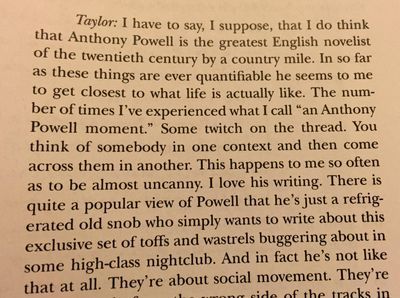A straw Powell
Some are born to it, some achieve it, and some . . . you know what I'm talking about, of course: greatness. Whatever the Dickens that is.
Literary greatness does not necessarily apply to the author whose books you enjoy most. Or whose books induce the worthy aching in the brain that lead their readers to boast about having finished them on social media.
In any case, when one TLS contributor, Jonathan Barnes, interviewed another, D. J. Taylor, for the Dictionary of Literary Biography series, Taylor, the author of the recently published The Prose Factory, offered this intriguing answer:
It's an interesting choice, not least because, as Taylor suggests towards the end of this passage, Powell does not seem to be especially fashionable at the moment, for the dreary reason that he may seem to some to be merely a snob. (Find me the writer who isn't on some level a snob, in the Thackerayan sense of the word.) Awareness about class, the little differences and dramas that arise from it, is surely too English a trait to be denied to a novelist (who is, in any case, meant to notice everything).
Then there's that suggestion about one thing novels can or should do: get as close as they can to describing what life is actually like. My personal pantheon (you don't have one, too?) contains few writers who do this, I suspect. Or at least they don't do it as directly as Powell does, creating that distinctive sensation of a twitch on the thread.
Lastly, I had to ask around the TLS office to see if any current editor here shares Taylor's high opinion of one of their most accomplished predecessors. (Powell worked part-time for the TLS and reviewed for the paper in a reliably splendid style for decades.)
Nobody did.
Instead, I was mischievously offered, as greatest English novelist of the twentieth century, J. R. R. Tolkien; then Nancy Mitford as "most enjoyable". Another card nominated . . . our former colleague Giles Foden. (Sorry, Giles.)
At last, after some longing looks at the wide open vistas towards Europe, Ireland and the Americas, we got down to indigenous brass tacks: D. H. Lawrence ("You Leavisite . . ."), Evelyn Waugh, Virginia Woolf ("doesn't she still owe us some copy?"), Anthony Burgess, E. M. Forster ("Nothing to put next to Sholokhov, of course, but . . ."), Iris Murdoch. The Scottish contingent hankered after Muriel Spark ("she only once set a novel north of the border"). The fiction editor digressed to point out that Conrad had written what she thought was the best English story of the last century (and no, it's not in the recent Penguin anthology edited by Philip Hensher).
And so the discussion veered off in various directions, dispersing away from one kind of greatness to another, separated by country miles . . . .
Peter Stothard's Blog
- Peter Stothard's profile
- 30 followers




